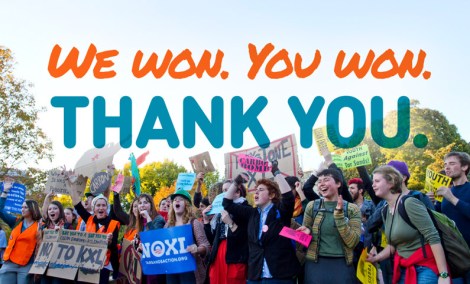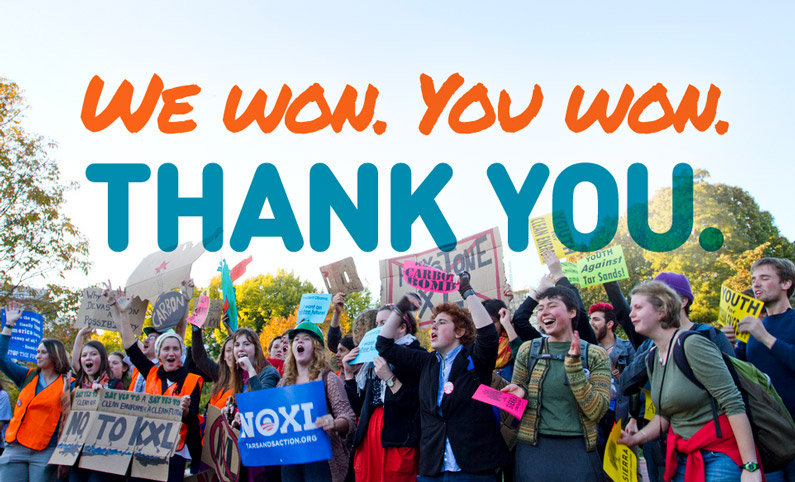
350.orgIt’s okay to celebrate, but even Bill McKibben doesn’t think the fight is over. And how big of a victory is the delay, anyway?
The Obama administration announced late last week that the Keystone XL tar-sands pipeline is going to be reassessed and possibly rerouted, delaying the final decision on its fate until after the election. The coalition that fought the pipeline — enviros, indigenous communities, Nebraska farmers, etc. — is, naturally, over the moon. (See Bill McKibben here and here.) For slightly more skeptical takes, see Bryan Walsh, Michael Levi, Andrew Leach, and George Hoberg.
I’m too mired in ambivalence about all this to draw any sweeping conclusions, but here are some thoughts on the questions raised.
Is the pipeline dead?
The anti-Keystone coalition is right to be celebrating a victory — very few people expected anything but an approval from Obama — but it’s a bit difficult to determine exactly how big the victory is. In announcing the decision, the State Dept. said that the new review would determine …
… whether the proposed pipeline was in the national interest, considering all of the relevant issues together. Among the relevant issues that would be considered are environmental concerns (including climate change), energy security, economic impacts, and foreign policy.
In speaking to the press, however, the State Dept. has emphasized the review’s limited scope:
But a wider review was rejected by Assistant Secretary of State Kerri-Ann Jones. She told reporters Thursday the process would focus on alternative routes.
Jones also ruled out any significant changes to the pipeline path outside of Nebraska, saying that for now the agency’s review will be limited to that state.
The theory I’ve heard is that State Dept. has to deal with the routing question and then, once that’s done, they’ll make a further determination about the national interest. I sure wish they were clearer exactly what they planned, though.
Lots of people are convinced that Obama is setting enviros up. State will rejigger the route and then he’ll approve it — he’ll just do it after the election, after receiving the support and money of well-heeled environmentalists.
I have no idea if that’s true; nor does anyone else, really. Bold assertions about the president’s Machiavellian intentions are about 98 percent ideological projection, in my experience. My guess is that Obama just wants to get it out of the news so he can concentrate on his jobs push against Congress. I doubt there’s been a ton of calculation beyond that. Maybe he’s even keeping an open mind and waiting to find what the review says!
The more interesting question is about economics: Will the delay alone be enough to sink the pipeline? Canada’s Finance Minister Jim Flaherty says it just might. After all, Keystone XL wasn’t in the planning stages — the company has already spent $1.7 billion on it. Pipeline was already being delivered on flatbeds. Now Transcanada will have to pay to store all that construction equipment and sit on its hands for 18 months as everything is reviewed. It has claimed that such delays will cost it $1 million a day. To make matters worse, as AP notes, the new route may cross more, smaller streams or come closer to population centers, necessitating more miles, more right-of-ways, more environmental reviews, more costs. There’s a good chance the company will decide to cut its losses and abandon the project altogether.
Will the development of Canadian tar sands be impeded?
The final demise of Keystone XL would be big deal politically, but it wouldn’t be the end of tar-sands development in Canada. After all, Flaherty also said that if Keystone XL dies, “we may have to move quickly to ensure that we can export our oil to Asia through British Columbia.” Canadian PM Stephen Harper echoed that sentiment in advance of a meeting with Obama the other day.
If the oil goes west, it will be done via the proposed Enbridge pipeline, leading west to a terminal at Kitimat, B.C. Not surprisingly, China is helping to pay for that one. (For much more on the state of play on western pipelines, see Kate Sheppard.
Alberta business professor Andrew Leach says it will be six to eight years before the existing network of pipelines out of the tar sands starts to run into physical constraints. Would a Keystone victory insure that those physical constraints bite? That they bite in time to leave some meaningful amount of tar sands undeveloped? Leach is skeptical, as am I. Killing Keystone will not be enough to defuse the “ticking time bomb” of tar sands. Everything, then, depends on what happens next. Which brings us to …
What is the movement for?
Perhaps greens can block the Enbridge pipeline too. Maybe they can spend decades blocking one tar sands (or oil shale, or mountaintop removal, or gas fracking) project after another. But is that the way for a climate movement to succeed?
Blocking projects is always possible, for the same reason the Keystone victory was: There are always locals who don’t want fossil fuel infrastructure in their back yard. NIMBYs are a powerful political force everywhere.
Michael Levi thinks climate hawks should shy away from these kind of alliances; you lie down with NIMBYs, he warns, you wake up with gridlock, and gridlock is not good for renewable energy development either.
I don’t quite buy Levi’s argument. There’s no reasons green can’t ally with NIMBYs against dirty energy and fight them on clean energy. Political movements are not held to wonk standards of tactical consistency; opportunism is fine if it’s effective. (Also, I found Bill McKibben’s rebuke to Levi quite powerful.)
The bigger problem is that NIMBYs are mainly good for stopping things. And that’s what greens have historically been best at: They are occasionally able to beat corporations or gov’t agencies into submission and restrain polluting development. What greens lack are similarly effective tools for building things.
Just ask 350. Last year, on Oct. 10, they held a “global work party.” Hundreds of groups of people around the world gathered to undertake tangible projects to improve their communities. It was an inspiring event and produced all kinds of great individual stories, but it got nowhere close to the press the Keystone protests got. It generated nothing like the same passion, unity, and momentum among greens.
It’s just harder to create positive change than it is to fight negative things. That’s not greens’ fault, really, it’s just human nature. It’s social dynamics. It’s politics. It has always been thus.
It’s particularly bad news for climate, though. In a way, it’s lamentable that the entire movement has been framed as a negative, “fighting” or “stopping” climate change. What’s most needed to meliorate climate change is not stopping anything but a third industrial revolution: radical innovation, a massive wave of construction the likes of which the world has never seen, and sweeping changes to our political and economic institutions. It’s a positive, generative project of truly gargantuan scale.
No amount of stopping things can create that kind of positive project. No amount of restrictions to fossil fuel supply can create a clean energy economy. That’s the Drug War approach: taking out dealer after dealer while massive demand insures continued supply. It doesn’t work.
Several people have made versions of this argument — Levi gets at it in his follow-up and Bryan Walsh too. But it’s one thing to say the climate movement needs to pivot from oppositional to generative. It’s another thing entirely to lay out a credible strategy. The fact is, nobody has any real clue how to get from where we are to serious climate policy — not pundits, not activists, not wonks. The one thing the pundit class has ever really been able to agree on is that liberal activists, whoever they currently are and whatever they’re currently doing, are Doing It Wrong.
So … that’s where I land on this. There’s no denying that this is a huge victory for a group of impassioned people who care about climate change. That can only be a good thing, especially given the run of defeats such folks have faced over the last few years. Victory, no matter how temporary or partial, builds social capital. It shifts political narratives. It generates some power and momentum, which is what greens most desperately lack.
I, like many others, have all sorts of opinions about how that power could be put to positive use. But you know what? People like Bill McKibben and Jane Kleeb got off their asses, brushed off the naysaying from pundits, and chalked up a win. Maybe they know something I don’t!




